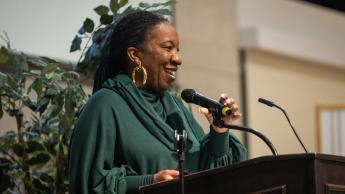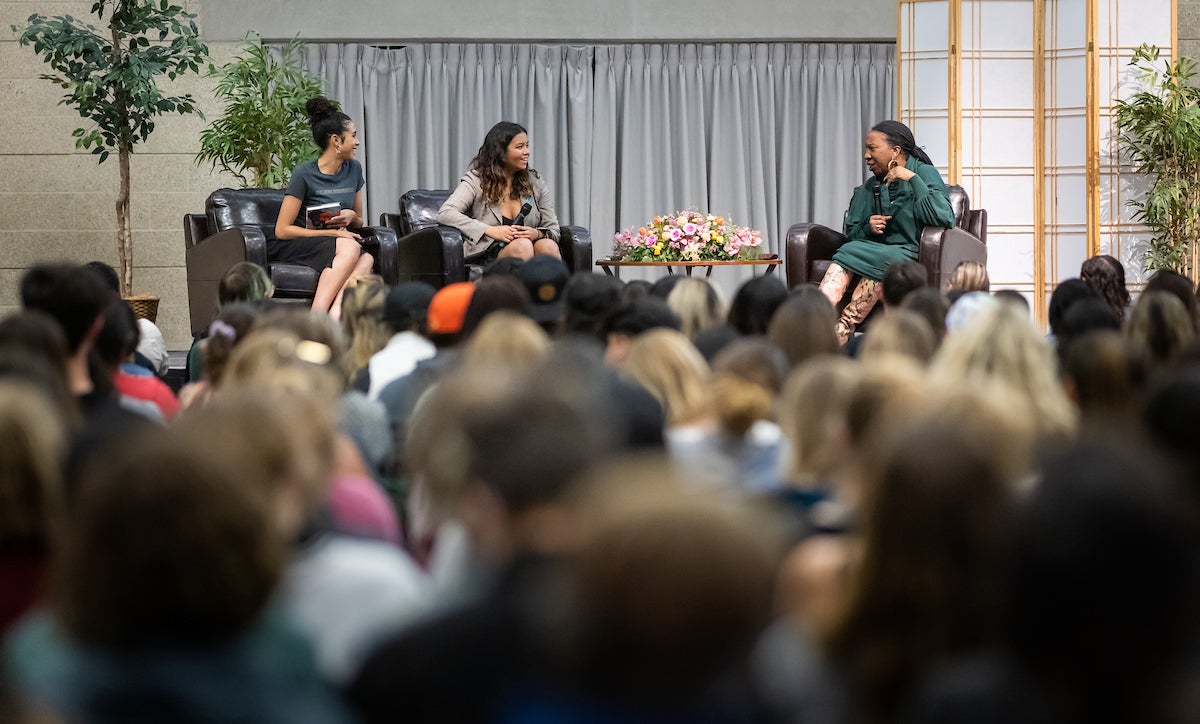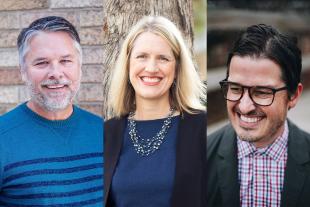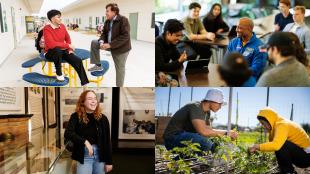‘Community Problems Deserve a Community Response.’ MeToo Founder Tarana Burke Speaks at Cal Poly

More than 750 students, faculty and community members packed a Cal Poly auditorium on April 11 for a presentation by activist Tarana Burke, founder of the MeToo Movement against sexual abuse, harassment and rape culture. Burke spoke at an event hosted by Safer, Cal Poly’s on-campus resource supporting sexual assault survivors, as part of a suite of campus activities commemorating Sexual Assault Awareness Month.
In her presentation, Burke described sexual violence as a social justice issue and a public health crisis, rather than just an individual crime perpetrated on one person by another.
“Community problems deserve a community response,” she said. “We built a movement so that people would see that a crisis of this proportion demands urgent, collective action. As long as we think of sexual violence as an individual issue, we will never see an end to this epidemic. We don’t want violence in our communities, and it’s going to take us all working together.”
Burke described sexual assault survivors as having more strength than many people give them credit for.
“People approach survivors from a place of pity,” she said. “But there’s power here — power in numbers. It’s about finding each other and building community with each other.”
Though Burke founded the MeToo movement in 2006, it went viral in 2017 in connection with public accusations against powerful Hollywood mogul Harvey Weinstein. In the wake of the Weinstein accusations, actress Alyssa Milano made a post asking women who had been sexually assaulted or harassed to use the hashtag #MeToo to share their stories. In just 24 hours, 12 million survivors came forward online using the movement’s #MeToo hashtag.
“These aren’t 12 million celebrities — they’re your friends, your family, your coworkers,” Burke said. “For millions of people, this was the first time in their lives when they could share their deepest and darkest secrets. For hundreds, it was the first time they had to face accountability for their actions.”
She noted a dangerous pushback against the movement, exemplified by the idea of people being “MeToo’d” — characterizing abusers as potential victims of a movement eager to come after them.
“This is not about cancel culture, or taking down powerful men. It’s about survivors, and changing laws and policies and culture,” she said. “We’re wondering who is going to get ‘MeToo’d’ next. But MeToo isn’t about the people who cause harm, it’s about the survivors. The media has turned MeToo into a gender war. That is a failing on all our parts.”

Burke, a Black woman who often focuses on marginalized communities in her work, took issue with media coverage of the MeToo movement that focused on the experiences of photogenic, mostly-white celebrities. She also pushed back against narratives that sought to sow conflict among survivors within the movement.
“I do center Black experiences, because if I don’t, we will be erased — we will be an afterthought,” she said. “But there is enough for everybody. If we start with the most marginalized, eventually we will all benefit.”
A sexual assault survivor herself, Burke described her own decades-long process of healing and the unexpected breakthrough she had when writing her memoir, Unbound: My Story of Liberation and the Birth of the Me Too Movement.
“Healing is not linear, it’s cyclical, and I experienced it more than ever when I wrote this book,” she said. “I told myself the truth more than I ever had. There’s more freedom when you let yourself learn the truth. I understand this journey better now, and I want this for you all. Keep telling yourself the truth because you deserve the freedom.”
Burke also took questions from two student moderators: architecture major and Black Student Union president Chloe Wardrick, and graphic communication major and Black Student Union vice president Maddie Jackson.
In response to a question from one of the moderators about the best path to a sexual violence-free future, Burke focused on rethinking how we educate children from the start.
“We need to normalize bodily autonomy,” she said. “It starts in early childhood — we need to educate and socialize young people about consent. Comprehensive sex education normalizes these things so we don’t have to wait until sixth grade or later to start thinking about them.”
Burke concluded the Q&A session by speaking about the importance of finding joy while doing such heavy work.
“There are days when I’m not resilient — there are days when I need people to pour joy into me and prop me up,” she said. “But there are times when I’m jubilant. This brings me joy, finding community with people.”
In addition to Burke’s presentation, Safer is hosting a series of other events focused on sexual assault awareness and survivor support throughout the month, concluding with the Take Back the Night vigil on the 28th at the University Union Plaza.
Want more Learn by Doing stories in your life? Sign up for our monthly newsletter, the Cal Poly News Recap!




